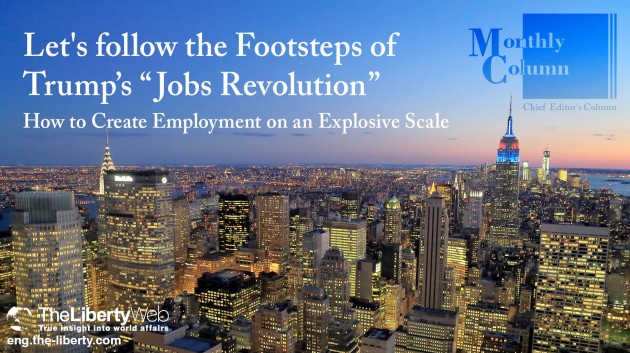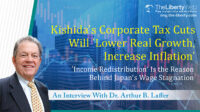Let’s follow the Footsteps of Trump’s “Jobs Revolution”
How to Create Employment on an Explosive Scale
Chief Editor’s Monthly Column
“[I] will be the greatest job producer God has ever created”, U.S. President Donald Trump said in January this year. The press is slamming Trump’s economic plan by saying he is ignoring economic theory. But his unbridled confidence in his ability to create jobs is sure to have some backing.
Revival of the Power to Produce
Put simply, job creation means that more people can earn income by being useful to other people. People work and produce goods and services, and earn income when other people buy them. The sum total of this income in a country is referred to as its “gross domestic product” or “GDP”.
This power to produce is low in developing countries. Therefore, they have to import durable consumer goods from overseas.
Developed countries, on the other hand, are able to produce most of their own necessities, and can make additional profit by selling products to other countries. This requires adequate infrastructure such as factories, roads, railways and ports. If they can obtain energy resources at low cost, production can be scaled-up.
However, in the 1980s many companies in the manufacturing industries in the U.S. and Japan moved their factories to China and other Asian countries to take advantage of their low labor costs.
Trump is trying to reverse this trend of globalization that made America move its companies and factories overseas to seek greater profits. That’s why he is trying to revive the ‘power to produce’ by bringing factories back, making infrastructure investments in the U.S., and securing supply of low-cost energy.
The Trump Administration and Innovation
Trump is clearly able to see the path that America must follow to become great again.
Trump is using his Twitter account as a tool to get companies to bring factories back. He has repeatedly criticized Toyota for planning to build a factory in Mexico.
The automotive industry is on the verge of new breakthroughs in auto-driving and electricity-powered vehicle technology. In other words, cars are about to become electrical appliances that can take you to your destination with the push of a button. If manufacturing facilities for these cars are built in the U.S., the U.S. will become a leading force in the automotive industry. This is the sort of thing Trump is trying to do.
Bill Gates told CNBC that Trump is “going to organize things . . . and have ‘American leadership through innovation’ be one of the things he gets behind”. Indeed, Trump is not being shy in his decisions on deregulation and corporate tax cuts. He is doing everything he can to incentivize companies to return to the U.S. and produce jobs, which will lead to increase in tax revenue.
Importing Japan’s Railway Culture
Trump’s infrastructure investment plan is centered on repairing old roads and airports, but he has also shown a keen interest in Japan’s high-speed railway network.
Railways are far more efficient than cars: transporting 1 person in a car requires 6 times more energy than transporting 1 person by rail. The U.S. is a vehicle society, but if travelling by bullet train became part of the culture, it would reduce energy costs and therefore add to the production power of goods and services.
In order to obtain a secure supply of low-cost energy, Trump has begun reversing Obama’s ‘clean energy development’ plan. Trump believes that global warming is nonsense and is trying to return to low-cost energy forms such as coal.
The discovery of shale gas has caused the cost of natural gas and electricity to fall, which is working to Trump’s advantage.
Under the Trump administration, America will make great strides in production and shipping. We can see from this how Trump will achieve his goal of job creation to make people more useful to society and able to earn a living.
Job Creation in Japan
There is nothing amiss with Trump’s approach to job creation: he knows how to make a country wealthy more effectively than proponents of economic theory.
Countries like Japan should follow Trump’s approach and revive the ‘power to produce’. Japan is in a similar position with its need to bring back companies from overseas to contribute to future industries. The highest priority should go to industries that speed up processes to create more time. The automatization of farming is one such industry and other industries are working on similar ideas, such as auto-drive vehicles. Developments in artificial intelligence have contributed significantly to household and nursing robot technology. Removing the burdensome corporate tax in Japan would definitely incentivize companies that have moved overseas to return home.
In terms of infrastructure investment, Japan should focus on speeding up transportation. There are still many regions that have no bullet train line, and with the coming Maglev lines, rural towns are expecting developments.
Japan is damaging its manufacturing industry by failing to obtain a secure supply of low-cost energy. Japan’s electricity costs are 2.5 times higher than the U.S.; gas costs are 4 times higher.
What must be done first is to recommence operations in all nuclear power plants. Since operations were terminated after the 2011 Great East Japan Earthquake, offices and factories have suffered a 40% increase in electricity costs.
It is clear that Japan needs to focus on creating jobs for its people to increase income.
Trump Speaks Like A Priest
When he was on the campaign trail, Trump often visited regional towns wearing a baseball cap. He probably did this to express his passion for the American dream held by many: a regular worker buys a house and watches baseball on the weekends.
The U.S. was originally a union founded by Protestants to protect their faith and become free of religious and other forms of oppression by the U.K. The Revolutionary War began as a protest against unfair taxes that had been imposed on the wealth they had earned through hard work. This Protestant work ethic of diligence are what underlies the American Dream.
In February each year, religious leaders from all over the country, and various industry leaders, gather at the National Prayer Breakfast in Washing D.C. In his speech at this year’s breakfast, Trump sounded like a priest:
“America is a nation of believers . . . [So] easily we forget this — that the quality of our lives is not defined by our material success, but our spiritual success . . . And I know a lot of people without that [material success], but they have great families. They have great faith. They don’t have money — at least not nearly to the extent — and they are happy. Those, to me, are the successful people.”
These words are all the more penetrating given that Trump himself is one of the most successful people in the U.S. This idea comes from the emphasis on faith and hard work to overcome strife that became the cornerstone of American independence.
By being focused on job creation, the Trump revolution is trying to bring back diligence and respect for the children of God to the U.S.
Japan too is awaiting the appearance of a religious politician who can create jobs and bring back the importance of diligence and faith.
(Jiro Ayaori)



















